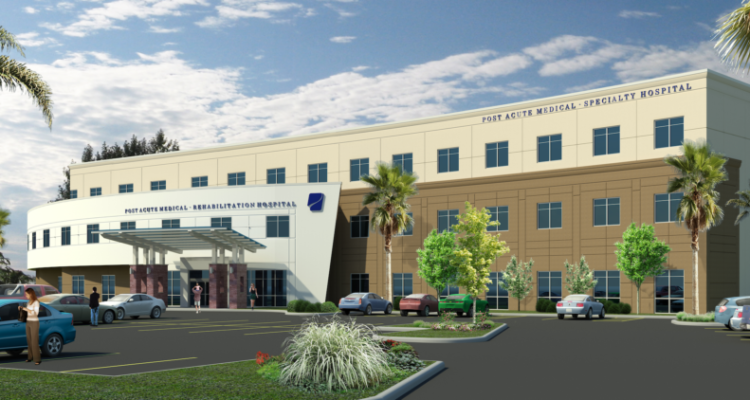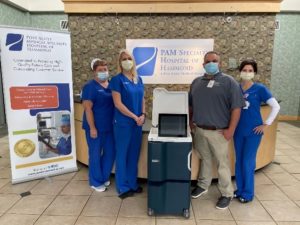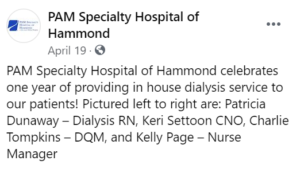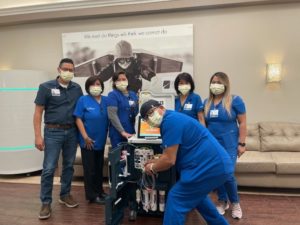PAM Health: Network-Wide Conversion to Tablo Delivers Impressive Results

Summary
The system is rolling out a full conversion to in-house dialysis with Tablo across its nationwide network of LTAC and rehab hospitals, with exceptional success to date, including positive outcomes and significant cost savings.
In September 2020, PAM Health, a healthcare network with 41 long-term acute care (LTAC) hospitals, inpatient rehabilitation facilities, and other services across 12 states, made a strategic investment in an increasingly costly area of patient care: dialysis. Corporate leadership made the decision to exit all its third-party outsourced dialysis contracts and convert its facilities to a full in-house service line with the Tablo Hemodialysis System. By doing so, their goals were to enhance the network’s competitive edge by attracting patients and staff, increasing staff efficiencies, and reducing the cost of dialysis care. Preliminary data shows that the conversion effort has resulted in many benefits, including a significant cost reduction across the network.
Jerry Elenbaas, PAM Health’s Division President of Hospital Operations, provided a big-picture perspective on the network’s overall strategy and Tablo implementation experience to date. About 20 of its hospitals have successfully converted their dialysis programs to date, with many more planned over the coming months. “Our results have been impressive overall, with excellent roll-out experiences, no major issues, and positive outcomes,” he says.
“We’ve seen a significant, meaningful difference in cost for our company.”
“We’ve seen a significant, meaningful difference in cost for our company,” he continues.
PAM Health also brought on a seasoned Corporate Director of Dialysis, Kimberly Bordelon, BSN, RN, CNN, to spearhead the Tablo in-house dialysis program local and federal policies, procedures and implementations across its network. “The goal is to take the best possible care of our patients. We are now able to control the timing and efficiency of when they receive other required therapies, along with their dialysis,” she says.
How has PAM Health been able to make such a positive impact on their bottom line? The strategy included a successful conversion test run, and initiating a quarterly launch plan across its network.
A “Unicorn” Pilot Launch
In late 2019, Elenbaas was introduced to Tablo by a hospital CEO friend in Vidalia, LA, who had completed a successful in-house dialysis conversion. Elenbaas presented the idea to PAM Health’s corporate leadership. “They saw the value in huge potential savings and the clinical and other advantages of the Tablo device. We made our decision in January 2020, and by March, just as the pandemic was picking up steam, we were rolling out Tablo units in Hammond, Louisiana,” he says.
PAM Health Specialty Hospital of Hammond became the test site for a full in-house Tablo conversion based on several factors. “We chose to do our first conversion there because of the stability of the staff, and good nephrologist support and leadership,” Elenbaas continued. “It was a ‘safe zone’ for us to embark on something as big as a full-service line like dialysis. We encountered very few hurdles with that launch, it was more of a short learning curve for the team. We got through that roll-out within our forecasted timeline, even with the team handling the influx of COVID-19 patients.”
“With excellent support from Outset Medical, the machines performed better than expected. We had a bit of a ‘unicorn’ roll-out there. We were expecting some hiccups but encountered none. Our Tablo dialysis program in Hammond has been going well for over a year now. We’ve had only positive outcomes with patient care, and patient and nurse feedback,” he continues. (The Hammond team is pictured in a 4/19/21 Facebook post here.)


Next Phase: System-Wide Conversion by Quarter
Once PAM Health’s corporate leadership saw the excellent 90-day data and outcomes from the Hammond implementation, Elenbaas says that’s when they began strategizing on a nationwide, quarter-by-quarter, full-service line conversion plan. They then planned launches at facilities in Shreveport, Denver, Sarasota, Dayton, and other locations. Currently, Bordelon is overseeing a wave of implementations in process at facilities across several states.
“The decision was made to convert our other hospitals to Tablo, with facility types varying from freestanding hospitals to hospital-within-a-hospital [HIH] models. We have achieved a great deal of success since initiating this strategic plan, and haven’t deviated much at all from the excellent results we achieved in Hammond,” says Elenbaas.
In-House Dialysis: Planning for Success
Elenbaas notes for other hospital systems that might be considering Tablo, he understands the concerns that they might have about committing to an insourced dialysis model.
“It can be overwhelming for a healthcare operator to exit an outsourced service and go completely in-house with a new service line—especially with something as complex as dialysis, and if you have challenges such as limited staff,” he says. “In my opinion, your highest risk point is when you’re actually getting the new technology up and running. You want to make sure that it’s done safely, that you have met all your regulatory obligations, and that you have all your policies and procedures in place.”
Bordelon notes that finding experienced dialysis nurses is also a challenge, although the Tablo system’s user-friendliness has been very helpful in getting their teams trained. Training includes on-site experience with teams at other PAM Health facilities that are already running in-house Tablo programs and cross-training other nursing staff. “There is always a bit of angst among the team when you first start an in-house program. The Outset team has been very supportive for all of our Tablo roll-outs, helping us in any way we need,” she adds.
“I have been pleasantly surprised that Hammond was not a unicorn. We’ve found our launches to be strategically well planned and executed, and much less resource-intensive than expected,” says Elenbaas. “With the Tablo system’s ease of training and use and Outset Medical’s support this has helped us mitigate any concerns or anxiety. I’ve been a part of many implementations with other vendors, having been an RN myself for 25 years and a dialysis nurse, and in general, they don’t go as orchestrated. For these reasons, Tablo should be considered by any healthcare entity.”
Conversion Spotlight: PAM Health Specialty Hospital of Las Vegas
A recent conversation with the leadership team at PAM Health Specialty Hospital of Las Vegas, the largest LTAC in its area, illustrates the success being seen throughout the PAM Health network. At the Las Vegas facility, dialysis care is one of the core services that the center, along with a sister facility that shares the same dialysis nurses—PAM Health Rehabilitation Hospital of Centennial Hills—now provides in-house to patients with a fleet of Tablo dialysis systems. Both facilities provide intermittent hemodialysis to patients in the ICU and bedside.

Ryan Keele, CEO of PAM Health Specialty Hospital of Las Vegas, and CNO David White, MSN, BSN, RN, note that the staffing workflow, patient outcomes, and cost savings benefits following its Tablo conversion have been tremendous. “Importantly, we’ve been able to achieve significant total cost savings, since we moved to Tablo. Our return on investment is substantial,” says Keele.
The Las Vegas team worked with Outset Medical to develop and execute a comprehensive implementation and staffing plan, including training their team of full-time and per-diem dialysis nurses. The facility also hired a dialysis director, Tess Jacobe, a nurse for more than 30 years, with prior experience using many types of dialysis machines, including Tablo.
“By the time the Tablo units arrived, we were well prepared. Tess’ experience on Tablo, most recently at Kindred Hospital, was invaluable to us as we implemented our in-house program. Training with our team was a quick and easy process, as most of the other nurses also had previous experience with Tablo. Our go-live was also very smooth,” Keele continues.
“I learned dialysis the hard way: on previous machines,” says Jacobe, with a laugh. “What I like most about Tablo is that it’s designed for patient safety, and is very easy to learn and use. I am very happy with it. As I tell my team, we must always do the right thing for the patient. Tablo, with its built-in safety features, makes sure we do that. It’s so smart.”
White notes that nursing efficiency at the Las Vegas facilities has also improved since the dialysis team is now their own staff. “They can manage their own treatments, and Tablo handles all the dialysis EHR documentation—processes that would slow everybody down when we were using a third-party provider. And, they can check on treatments going on at PAM Health Rehab. Our nurses now have smiles on their faces. Also, their backs aren’t hurting from pulling huge RO machines and carrying dialysate bags,” says White. Tablo requires only an electrical outlet, tap water, and a drain to operate, freeing providers from the burdensome infrastructure and costly dialysis medical supplies required to operate traditional machines.
Keele and White also say that the conversion to Tablo was also a seamless transition for their nephrologists, who are very satisfied.
Patients have also expressed their satisfaction. “One chronic patient who was being discharged from PAM Health Specialty to our Rehab facility told me that he was worried about having dialysis on a different machine. But I told him, don’t worry, we have Tablo machines at PAM Rehab too,” says Jacobe.
“From my perspective, Tablo has created an environment that our staff and patients are much more satisfied with,” says Keele. “I don’t think it would have been an option to go full in-house with any other machines.”
About PAM Health, LLC
PAM Health, LLC, based in Enola, PA, provides post-acute healthcare services through 41 long-term acute care hospitals and inpatient rehabilitation hospitals, as well as more than 32 outpatient physical therapy locations, in 12 states. PAM Health is committed to providing high-quality patient care and outstanding customer service, coupled with the loyalty and dedication of highly trained staff, to be the most trusted source for post-acute services in every community it serves. Our mission is to serve people by providing compassionate, expert care and to support recovery through education and research. Learn more at postacutemedical.com.

